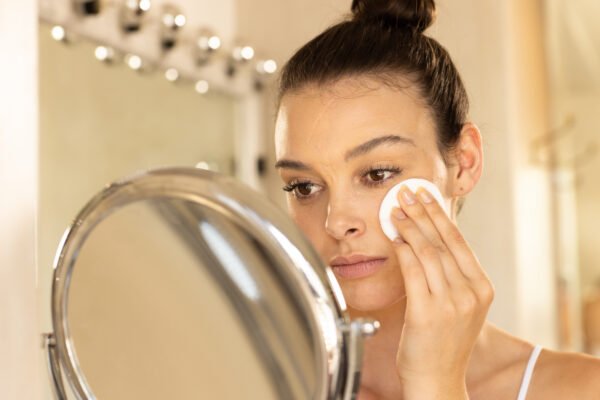Introduction
Why do certain skincare products work for your buddy but hurt your skin? Knowing your skin type is key. Knowing your skin type unlocks a customized skincare program that may give you healthy, glowing skin. It’s important to understand the various types of skin and how to care for them. Let’s start your healthier, brighter skin journey!
The Basics of Skin Types
Let’s go over the basics first before getting into the details. Oily, dry, mixed, average, and sensitive are the five main skin types. There are different traits, needs, and ways to care for each skin type. If you know about these types, you can pick the best skin care goods and methods for your face.
Oily Skin Explained
If you have oily skin, your pores will look bigger, and you will break out a lot. This skin type makes too much sebum, which can clog pores and cause acne.
Causes of Oily Skin
Genetics often play a big role in why someone has oily skin. Changes in hormones, like those that happen during puberty or pregnancy, can also make the body make more oil. Using the wrong skincare items can also make oiliness worse.
Caring for Oily Skin
If you have oily skin, you should use items that stop the skin from making oil without removing its natural wetness. Cleansers with glycollic acid, light moisturizers, and makeup that won’t clog pores are all things you should look for. Also, exfoliating often can help keep pores clear and cut down on shine.
Tips for Managing Oily Skin
- Use blotting papers throughout the day to manage excess oil.
- Choose oil-free and non-comedogenic products.
- Avoid over-washing, as it can stimulate more oil production.
Understanding Dry Skin
Dry skin doesn’t have enough water in it, so it can feel tight, rough, and flaky. It may have fine lines or red spots and looks dull most of the time.
Causes of Dry Skin
Things in the environment, like cold weather, low humidity, and hot baths, can dry out the skin. Dry skin can also be caused by getting older and some medical diseases, like acne.
Caring for Dry Skin
Dry skin needs to be kept moist. Cleansers that are gentle moisturizers that are rich in ingredients like hyaluronic acid, glycerin, and ceramides should be used. Don’t use rough scrubs or take long, hot baths.
Tips for Managing Dry Skin
- Apply moisturizer immediately after showering to lock in moisture.
- Use a humidifier in your home to add moisture to the air.
- Avoid products with alcohol and fragrances, which can further dry out the skin.
The Intricacies of Combination Skin
People with combination skin have both sticky and dry spots. In most people, the T-zone (forehead, nose, and chin) is sticky, but the lips are normal or dry.
Causes of Combination Skin
People with combination skin may have it because of their genes or because they use the wrong skincare items. Changes in hormones can also make different parts of the face produce more or less oil.
Caring for Combination Skin
For mixed skin, it’s important to have a well-balanced skin care practice. Use a gentle cleaner and a moisturizer that is light and won’t clog pores. You might need different products for different parts of your face, like a matte product for your T-zone and a moisturizing one for your cheeks.
Tips for Managing Combination Skin
- Use blotting papers or powder on oily areas to control shine.
- Apply hydrating serums and creams to dry areas.
- Be mindful of using products that cater to both skin types.
The Beauty of Normal Skin
Normal skin doesn’t have too much oil or too little wetness. It feels smooth, has small pores, and looks beautiful.
Characteristics of Normal Skin
Normal skin doesn’t usually have any problems or allergies. The tone is even, and it doesn’t feel too oily or too dry. Compared to other skin types, this one doesn’t need as much care.
Caring for Normal Skin
Normal skin doesn’t need as much special care, but it’s still important to stick to a schedule. Every day, use a mild wash, a mixed moisturizer, and sunscreen. Regular exfoliation will keep your skin smooth and glowing.
Tips for Maintaining Normal Skin
- Stick to a basic skincare routine to maintain balance.
- Protect your skin from sun damage with SPF.
- Keep your diet and lifestyle healthy to support skin health.
Decoding Sensitive Skin
Sensitive skin can get red, irritated, and respond to products. It might itch, burn, or get swollen quickly.
Causes of Sensitive Skin
Things like strong skin care products, outdoor pollutants, and allergies can cause sensitive skin. Skin problems like acne and eczema can also make you more sensitive.
Caring for Sensitive Skin
Pick items that are made especially for sensitive skin; they usually don’t have any harsh chemicals, fragrances, or colors in them. Look for things that make you feel better, like oatmeal, chamomile, and aloe vera.
Tips for Managing Sensitive Skin
- Patch-test new products before full application.
- Avoid hot water and harsh exfoliants.
- Use hypoallergenic and fragrance-free products.
Identifying Your Skin Type
The first step in making your skincare practice fit your skin type is to find out what it is. These easy ways will help you find it:
The Bare-Faced Method
Use a mild cleaner to wash your face, then wait an hour before putting anything else on it. Pay attention to how your skin looks and feels:
- Shiny and greasy areas indicate oily skin.
- Tight and flaky areas suggest dry skin.
- A mix of oily and dry areas points to combination skin.
- Balanced and comfortable skin signifies normal skin.
- Redness and irritation suggest sensitive skin.
The Blotting Paper Test
Place blotting paper on different parts of your face and press it down:
- Excess oil on the paper indicates oily skin.
- Little to no oil suggests dry skin.
- Oil only in the T-zone points to combination skin.
- A moderate amount of oil signifies normal skin.
The Importance of Knowing Your Skin Type
Figuring out your skin type is important for many reasons:
- It helps you choose the right products.
- It prevents using products that may harm your skin.
- It allows you to address specific skin concerns effectively.
Common Misconceptions About Skin Types
Skin type is the subject of numerous myths. Let’s bust a few:
Myth 1: Oily Skin Doesn’t Need Moisturizer
Not true! Oily skin still needs to be kept moist. If you don’t use moisturizer, your skin may make more oil.
Myth 2: Dry Skin Doesn’t Break Out
Even if your face is dry, you can still get acne. Dry skin and clogged pores can be caused by not getting enough water.
Myth 3: Sensitive Skin Is Always Red
Sensitive skin can be hot, but if you take good care of it, it can also be calm and look normal.
Tailoring Your Routine to Your Skin Type
Here’s how to make your schedule fit your skin type once you know it:
Oily Skin
- Cleanser with salicylic acid.
- Lightweight, non-comedogenic moisturizer.
- Clay masks to absorb excess oil.
Dry Skin
- Hydrating cleanser.
- Rich moisturizer with hyaluronic acid.
- Avoiding harsh exfoliants.
Combination Skin
- Gentle cleanser.
- Different products for different areas.
- Balancing products that suit both skin types.
Normal Skin
- Basic cleanser and moisturizer.
- Regular exfoliation.
- Daily SPF.
Sensitive Skin
- Fragrance-free and hypoallergenic products.
- Calming ingredients like chamomile.
- Gentle, soothing cleansers.
The Role of Diet and Lifestyle in Skin Health
Your face shows how healthy you are generally. To help your face from the inside out, try these tips:
Healthy Diet
- Consume plenty of fruits and vegetables.
- Drink lots of water.
- Avoid excess sugar and processed foods.
Regular Exercise
- Improves blood circulation.
- It helps manage stress.
- Promotes overall well-being.
Adequate Sleep
- It helps skin repair and regenerate.
- Reduces dark circles and puffiness.
- Contributes to a radiant complexion.
Final Thoughts on Skin Types
Effective skincare starts with skin type. It helps you choose products, prevent irritations, and have the skin you’ve always wanted. Following this guide’s instructions will give you a lovely complexion.
Consult a dermatologist for personalized guidance. They may personalize advice to your skin’s requirements and worries. Happy skincare, fans!








